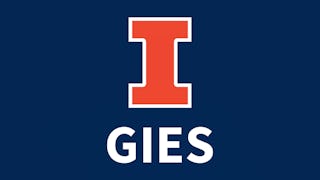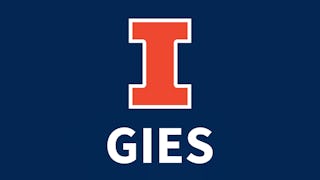This course builds upon what you learned in Financial Accounting: Foundations and Financial Accounting: Advanced Topics and introduces you to formal foundations of financial accounting. The main purpose of the course is to familiarize you with technical terms in financial accounting, such as debit, credit and T-account. While knowledge on technical aspects of financial accounting is not necessary to understand and interpret financial statements, this knowledge is critical to be able to understand advanced topics in accounting. Formal Financial Accounting is a prerequisite course for the University of Illinois' iMSA program and the terminology we will cover will be used throughout the courses in iMSA program.



(375 reviews)
What you'll learn
Understand technical aspects of financial accounting.
Have a command of knowledge on formal terminology of financial accounting.
Record financial information in accounting language using T-accounts.
Construct main financial statements from T-accounts.
Skills you'll gain
Details to know

Add to your LinkedIn profile
14 assignments
See how employees at top companies are mastering in-demand skills


Earn a career certificate
Add this credential to your LinkedIn profile, resume, or CV
Share it on social media and in your performance review

There are 5 modules in this course
In this module, you will become familiar with the course, your instructor, your classmates, and your learning environment. This orientation will also help you obtain the technical skills required to navigate and be successful in this course.
What's included
2 videos5 readings1 assignment1 discussion prompt
Accounting is the language of business. Managers communicate results of operations within a firm through accounting to various financial information users including investors and creditors. The main purpose of this module is to familiarize you with technical terms in financial accounting such as debit, credit, and T-account.
What's included
4 videos1 reading4 assignments
One of the major components of a balance sheet is assets. Accounts receivables, inventories, and plant, property, and equipment constitute a major part of the assets. Understanding accounting for these accounts will help you uncover how these accounts change over time, their valuation, and their usefulness in managerial decision making.
What's included
4 videos2 readings4 assignments
The major sources of financing for many firms are liabilities and equity. Firms routinely finance their operations through various liabilities including accounts payables, bank loans, and bonds. They also raise funds from their investors through IPOs and SEOs. Finally, retained earnings (earnings earned but not distributed to investors) constitute a significant source of financing. Accounting for liabilities and shareholders’ equity will help you understand how formal financial accounting for liabilities and shareholders’ equity accounts are conducted.
What's included
4 videos1 reading4 assignments
The accounting cycle starts with financial transactions, and continues with journalizing these transactions and posting the journal entries on the ledger. At the end of the year, the trial balance is prepared. The final step is to prepare financial statements from trial balance numbers. This module will go over a comprehensive exercise, which will track the accounting cycle of a firm from its establishment until its fiscal year-end financial statements.
What's included
2 videos2 readings1 assignment
Instructor

Offered by
Recommended if you're interested in Business Essentials


University of Illinois Urbana-Champaign


University of Illinois Urbana-Champaign


Fundação Instituto de Administração


University of Illinois Urbana-Champaign
Why people choose Coursera for their career




Learner reviews
375 reviews
- 5 stars
81.91%
- 4 stars
14.36%
- 3 stars
1.86%
- 2 stars
1.32%
- 1 star
0.53%
Showing 3 of 375
Reviewed on Nov 23, 2023
Excellent, instructor was very good, made the material understandable .
Reviewed on Apr 24, 2020
It's a good course if you took previously 2 courses "Financial Accounting Fundamentals and Financial AccountingAdvanced Topics".
Reviewed on Jul 14, 2020
Thank you very much. Very very impressed with this course and useful to me.
New to Business Essentials? Start here.

Open new doors with Coursera Plus
Unlimited access to 10,000+ world-class courses, hands-on projects, and job-ready certificate programs - all included in your subscription
Advance your career with an online degree
Earn a degree from world-class universities - 100% online
Join over 3,400 global companies that choose Coursera for Business
Upskill your employees to excel in the digital economy
Frequently asked questions
Once you enroll for a Certificate, you’ll have access to all videos, quizzes, and programming assignments (if applicable). If you choose to explore the course without purchasing, you may not be able to access certain assignments.
You will be eligible for a full refund until 2 weeks after your payment date. You cannot receive a refund once you’ve earned a Course Certificate, even if you complete the course within the 2-week refund period. View our full refund policy.
Yes! Coursera provides financial aid to learners who would like to complete a course but cannot afford the course fee. To apply for aid, select "Learn more and apply" in the Financial Aid section below the "Enroll" button. You'll be prompted to complete a simple application; no other paperwork is required.
More questions
Financial aid available,


